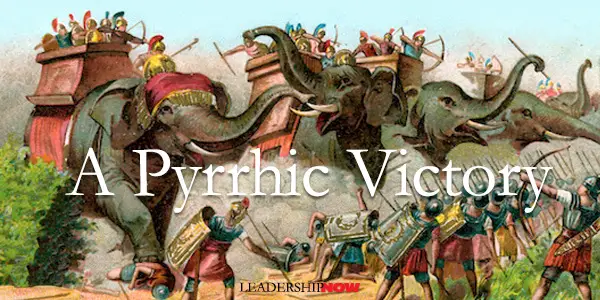 |
 |
04.30.07

A Pyrrhic Victory
IN 279 BC, 40,000 Romans battled for two days against 40,000 Greeks and their 20 war elephants in the hills of southeastern Italy near Asculum. The Greeks were under the command of King Pyrrhus. According to the great Carthaginian general Hannibal, he was the greatest general the world had seen since Alexander the Great. The first day of battle accomplished little. The two sides fought an indecisive battle. Over the next day, the Romans were forced back, but Pyrrhus was unable to capture their camp. Finally, at the end of the day, seeing the futility of continuing, the armies separated. The Romans had lost 6,000 men and the Greeks 3,500 including many officers. It was a costly victory for Pyrrhus. At dawn the next morning, in response to congratulations for his victory over the Romans, the historian Plutarch relates that Pyrrhus confessed, “one more such victory would utterly undo him.” The battle had been won at too high a cost. Although they never defeated Pyrrhus on the field, the Romans were able to win a war of attrition. Henceforth, no soldier would cheer a Pyrrhic victory. We, too, have battles to fight from time to time. Some battles though can be won at too high a cost. As Pyrrhus admitted, some battles can literally undo us. If we are not careful we can let situations and our ego get the best of us. We can undermine our purpose of serving and lifting up those we lead. Winning an argument can destroy our influence and cost us a relationship. In Pearls of Wisdom, Joyce Brothers wrote, “There is a rule in sailing where the more maneuverable ship should give way to the less maneuverable craft. I think this is sometimes a good rule to follow in human relationships as well.” Relationships are what leadership is all about. As the leader, we are the more maneuverable ship. Being immovable or stubborn, just because we are right, doesn’t move us closer to our goal. It is up to us to step back, bend, or give way and let the other person pass. Later we might try a different tack if it is really that important to make the point. Hitting a difficult person head on is rarely the appropriate action. When we come up against conflict, we must ask ourselves if winning this one is really that important. How will winning affect my ability to work with this person? What is motivating me to win? We don’t need to fight every battle. We should choose battles that in the final analysis will strengthen our relationships and improve our effectiveness.
Posted by Michael McKinney at 09:53 AM
|
BUILD YOUR KNOWLEDGE
 

How to Do Your Start-Up Right STRAIGHT TALK FOR START-UPS 
Grow Your Leadership Skills NEW AND UPCOMING LEADERSHIP BOOKS 
Leadership Minute BITE-SIZE CONCEPTS YOU CAN CHEW ON 
Classic Leadership Books BOOKS TO READ BEFORE YOU LEAD |